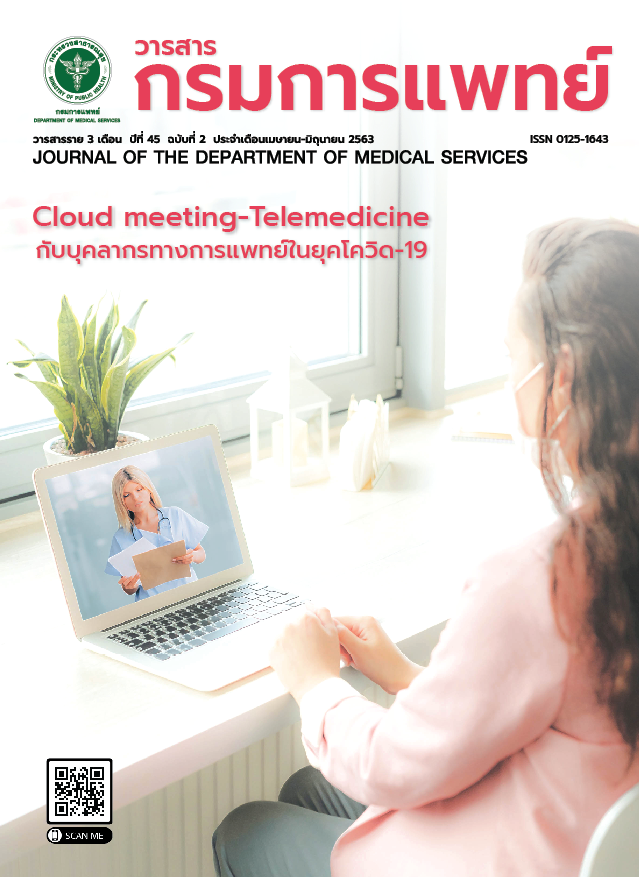The Relationship between Selected Factors and Psychological Well-being among Caregivers of Children with Autism in the Eastern Thailand
Keywords:
Caregiver of children with ASD, Psychological well-being, Caregiver burden perception, Optimism, Social supportAbstract
Background: Caring of Autism Spectrum Disorder (ASD) affects caregivers both physically, mentally, and socially. The ASD caregiver’s well-being should be concerned by society.
Objective: The purpose of this descriptive correlational research was to examine the relationship between psychological well-being and selected factors among caregivers of ASD in the Eastern Thailand.
Method: The samples consisted of 135 caregivers of ASD. The purposive sampling was used to select the samples. The instruments included five questionnaires: 1) the demographic data 2) the psychological well-being questionnaires 3) burden questionnaires 4) the life orientation test and 5) personal resource.
The Cronbach’s alpha coefficient of second to fifth questionnaires were 0.89, 0.96, 0.92 and 0.94 respectively. Data were analyzed using percentage, mean, standard deviation, and Pearson’s product moment correlation coefficient.
Result: The results showed that psychological well-being of caregiver of ASD were in middle range (65.82 ±15.23). Factors related with psychological well-being of caregiver of ASD were perceived burden, optimism, and social support (r = -.59, r = .54 และ r = .53, p < .001 respectively). Perceived burden had negatively related to psychological well-being, while optimism and social support had positively related to psychological well-being.
Conclusion: The findings indicated that health care providers should concern about enhancing psychological well-being by strengthening optimism and social support. Burden should be relieved to promote quality of life in caregivers of children with autism.
References
American Psychiatric Association. Diagnostic and statistical manual of mentaldisorders. 5th ed. Arlington, VA: American Psychiatric Association; 2013: 51-9.
Bodla GM, Saima W, Ammara T. Social support and psychological wellbeing among parents of intellectually challenged children. International Journal of Rehabilitation Sciences 2012; 10:29-35.
Zaki RA, Gehan EL, Nabawy GEL, Moawad A. Influence of autism awareness on the psychological well-being of mothers caring for their children with autism. Journal of Nursing Education and Practice 2016; 6:90-100.
Cappe E, Wolff M, Bobet R, Adrien J. Quality of life: a key variable to consider in the evaluation of adjustment in parents of children with autism spectrum disorders and in the development of relevant support and assistance programmes. Quality of Life Research: An International Journal of Quality of Life Aspects of Treatment, Care & Rehabilitation 2011; 20:1279–94.
Dupuy HJ. The general well-being schedule. In: McDowell F, Newell C, editors. A measuring health: A guide to rating scales and questionnaires. New York: Oxford University Press; 1977: 206-13.
Pongsitthisak P. Relationships between personal factors, objective burden, family hardiness, hope, and psychological well-being of schizophrenic patient’s family caregivers in Jitavej Khonkhaen Rajangarindra Hospital [Master thesis]. Bangkok: Chulalongkorn University; 2003.
Montgomery R. Using and interpreting the Montgomery Borgatta Caregiver Burden Scale [internet]. 2006 [Cited 2017 Aug 20]. Available from: http://www.uwm.edu/SSW//facstaff/ bio/Burden%20Scale.pdf
Goleman D. Working with emotional intelligence. New York: Bantam Book; 2000.
Mahithanupup P, Savangsopakul B. Optimism, developmental task performance, and psychological well-being of the elderly in Wang Nam Khiao district, Nakhon Ratchasima Province. Journal of Social Science and Humanities, 2012; 38:166-78.
Brandt PA, Weinert C. PRQ: Psychometric update. Unpublished manuscript. Washington, DC: University of Washington, School of Nursing; 1985.
Meesri K, Dangdomyouth P. Selected factors related to capabilities among caregivers of schizophrenic patients in community. Journal of Mental Health of Thailand 2012; 26:35-49.
Immak N. The relationships between self-esteem, marital relationship, social support, and psychological well-being in first time pregnant adolescents [Master thesis]. Khon Kaen: Khon Kaen University; 2009.
Tabachnick BG, Fidell LS. Using multivariate statistics 5th ed. Boston: Pearson Education; 2007.
Hanucharurnkul S, Intrasombat P, Puttawanta P. Distractions in daily life the coherence and perception of well-being in the lives of nursing in college. The Thai journal of Nursing Council 1989;38:169-90.
Toonsiri C, Sunsern R, Lawang W. Development of the burden interview for caregivers of patients with chronic illness. Journal of Nursing Education 2011;4: 62-75.
Zarit SH, Zarit JM. The memory and behavior problems checklist and the burden interview. Gerontology Center, Penn State University; 1990.
Lerthattasilp T. Depression and caregiver burden among caregivers of children with autistic spectrum disorders at Thammasat University Hospital. Bangkok: Research project for performance development, Department of Psychiatry, Thammasat University Hospital; 2015.
Maturapodpong S. Hope, optimism, and resilience as predictors of performance, job satisfaction, work happiness, and organizational commitment. Veridian E-Journal (Humanities, Social Sciences and arts) 2012; 5:306-18.
Scheier MF, Carver CS. Effects of optimism on psychological and physical wellbeing: Theoretical overview and empirical update. Cognitive Therapy and Research 1994; 16:201-28.
Thungmiphon P. Social support, caregiving preparedness and stress among mothers of autistic children [Master thesis]. Chiang Mai: Chiang Mai University; 2005.
Ferriter M, Huband N. Experiences of parents with a son or daughter suffering from schizophrenia. Journal of Psychiatric and Mental Health Nursing 2003;10:552-60.
Srirath J, Rodcumdee B, Suktrakul S. Experiences of mothers of school-age autistic children perceiving affiliate stigma. Journal of the Royal Thai Army Nurses 2018;19:211-19.
Boonluk C. The Relationships among selected factors, caregiving burden, and family well-being in mothers of children with autistic disorders [Master thesis]. Bangkok: Mahidol University; 2005.
Kaspad M, Monkong S, Sirapo-ngam Y. Effects of an empowerment-based program on psychological well-being and quality of life among family caregivers of patients with advanced breast cancer [Master thesis]. Bangkok: Mahidol University; 2013.
Kristin DN, Daniel JF. Self-Compassion and well-being in parents of children with autism. Retrieved August 20, 2017, from https://link.springer.com/article/10.1007/s12671-014-0359-2
Chimsuk N, Dangdomyouth P. Selected factors related to psychological distress on family caregivers of schizophrenic patients. The journal of psychiatric nursing and mental health 2014; 28:49-62.
Nimbute S. A study of social support and adaptation of autistic children’s mothers outpatients department, Rajanukul Institude [Master thesis]. Bangkok: Chulalongkorn University; 2014.
Downloads
Published
How to Cite
Issue
Section
License
บทความที่ได้รับการตีพิมพ์เป็นลิขสิทธิ์ของกรมการแพทย์ กระทรวงสาธารณสุข
ข้อความและข้อคิดเห็นต่างๆ เป็นของผู้เขียนบทความ ไม่ใช่ความเห็นของกองบรรณาธิการหรือของวารสารกรมการแพทย์



